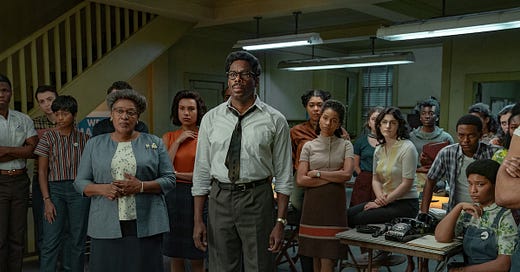Rustin
A largely forgotten civil rights organizer gets his due in this solid drama starring Colman Domingo as the man who dreamed up the event where MLK gave his iconic "I have a dream" speech.
One of my favorite type of historical films is shining a light on figures or events that have either been forgotten or swept under the rug of the “official” record.
“Rustin” is a prime example of this, spotlighting the political organizer who dreamed up the idea for the 1963 March on Washington where Dr. Martin Luther King, Jr. gave his iconic “I have a dream” speech.
It’s entirely fair to say that without Rustin, we would be in a very different place as a nation today.
Colman Domingo, best known from the “Fear the Walking Dead” TV show, gives a powerfully eclectic, Oscar-worthy turn as Bayard Rustin, the sort of genius every successful politician or public figure needs at their side. He’s not the guy to give the big speech, but the one who sets the table so the speech can happen at all.
Director George C. Wolfe — who also made “Ma Rainey’s Black Bottom,” the best film I saw in 2020 — and screenwriters Julian Breece and Dustin Lance Black go the route of a fairly conventional “great man” biopic.
It focuses on the period of 1960-63 when Rustin was ostracized from the primary leadership of the civil rights movement — largely because of his open homosexuality — and made his way back into the fold by working with MLK to launch what became the largest peaceful protest in American history.
It’s the sort of self-serious filmmaking where you’re watching a stemwinder of a monologue by Domingo and thinking to yourself, “This will be the clip they show during the Academy broadcast.” It knows what it is and makes no apology for its awards-bait ambitions.
But, as they say about trash-talking athletes, it’s not bragging if you can actually back it up. And “Rustin” does that.
As the story opens, Rustin relies on his personal friendship with MLK, with whom he’d already worked on the Montgomery bus boycotts and other civil rights flashpoints, to protect him from the powers-that-be. King is played by Aml Ameen, who unlike other recent cinematic portraiture has the benefit of actually resembling and sounding like the real thing.
This proves his undoing when nasty rumors are floated that King and Rustin are secretly lovers. Chris Rock plays NAACP chief Roy Wilkins, who seems more interested in protecting his place at the table than advancing social justice. Jeffrey Wright positively slithers as Congressman Adam Clayton Powell Jr., who thinks power is a zero-sum game and intends it all for himself.
Rustin resigns, spending the next few years in the wilderness working for a whites-led peacenik organization. But his idea for massive rally of 100,000 or more people on the National Mall in Washington D.C. takes hold, fueled by the conviction pending civil rights legislation will die in Congress again without a populist push.
The bulk of the film’s narrative centers around the planning of the event, overcoming logistical and systemic obstacles, getting the buy-in from MLK and other civil rights icons like Adam Clayton Powell Jr. (Glynn Turman) and Anna Arnold Hedgeman (CCH Pounder), and turning adversaries into allies.
Rustin is a crafty thinker, understanding he must navigate delicate influence centers while also contending with his own proclivity for speaking truth to power, usually with a rhetorical flourish while a cigarette is perched between his fingers.
“We do the work of the oppressors by oppressing ourselves,” is a typical salvo.
In between needling and begging from the higher-ups, Rustin leads a small army of mostly youngsters charged with organizing a thousand variables for the march. Buses, signs, protection from Black cops brought in from NYC, latrines, speaker systems, choosing PBJ sandwiches instead of cheese because of the heat — it’s practically akin to organizing the D-Day invasion, minus the weaponry.
This is all set against the backdrop of Rustin’s personal life, which he doesn’t exactly try to hide but understands he must keep a wrap on while in the midst of such a high-profile undertaking.
This grows difficult when he becomes embroiled with Elias Taylor, a rising young and very married preacher played by Johnny Ramey. There’s also his back-burner affair with Tom (Gus Halper), an eager young white worker who gets waived off to others as “my assistant.”
It’s a charismatic, masterful performance by Domingo, who noshes over his words like a gourmand choosing between delectables. He gives Rustin a prissy sort of charm, a man who has been otherized his whole life, even by other Blacks alongside he fights, and he has internalized the ever-present resentment and turned it around into a sort of invisible armor. Rustin practically dares you to hate him.
An off-kilter smile, the result of a long-ago beating at the hands of racist police, adds to his rakish conspicuousness.
Even if it doesn’t break a lot of boundaries in its filmmaking aesthetic, “Rustin” is an emotionally resonant portrait of a man who spent his whole life stepping over the line — to places we collectively needed to go.





